| (insert your NIE or newspaper logo here) |
Weekly Online LessonOnline Lesson ArchiveGrade Level: 7-12
|
Political Campaigning Pays Off
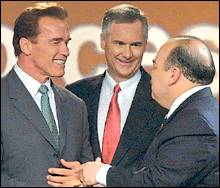 California
elected a new governor last Tuesday, after weeks of speculation and
contention during this unusual political race.
California
elected a new governor last Tuesday, after weeks of speculation and
contention during this unusual political race.
Movie actor and Republican Arnold Schwarzenegger won the most votes — 49 percent — and will become California's new governor.
The political campaigns of the 135 candidates vying for the governorship drew nationwide — and even global — attention. Politicians, the media, and the general public followed with interest — and sometimes with amusement — the election's odd mix of characters and circumstances.
While the frenzy of California's campaigning for governor ended with the October 7 vote, most other political races are just heating up with the nation's Election Day just around the corner. Like every first Tuesday of November, many voters will participate in choosing some of the people that govern their lives, such as city council members and state and federal representatives.
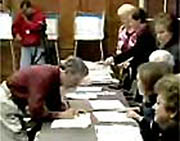 Meanwhile,
campaigning candidates for the title of "President" will only
get louder and more visible. Currently, nine Democratic candidates are
campaigning for their party's ticket. During the Democratic National
Convention in July, the party will choose one candidate to represent
them in the 2004 presidential election. Then that candidate, and those
representing any other active parties, will challenge President George
W. Bush in November.
Meanwhile,
campaigning candidates for the title of "President" will only
get louder and more visible. Currently, nine Democratic candidates are
campaigning for their party's ticket. During the Democratic National
Convention in July, the party will choose one candidate to represent
them in the 2004 presidential election. Then that candidate, and those
representing any other active parties, will challenge President George
W. Bush in November.
Following candidates on the campaign trail can get pretty interesting, as California's recent showing has proven. Ultimately, whatever a candidate's personality, background, or perspective, a well-coordinated campaign is essential for gaining the necessary media and public attention one needs to get the majority vote.
So this week, you're going to get get a solid viewpoint of how election campaigns work. You'll also get a glimpse of how media coverage of political campaigns has changed over the century, and how that may have also changed the ways by which voters decide to cast their ballots.
The Election Process
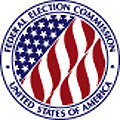 First
you need to understand How
Election Campaigns Work. Although this site was created
in 2000, what it explains holds true today.
First
you need to understand How
Election Campaigns Work. Although this site was created
in 2000, what it explains holds true today.
After you read about how the Constitution, and subsequent amendments, outlines the election fundamentals, find the answer to What does and election look like? Do any of those features seem familiar?
Also find out who Andy Brack is and where he's running. What experience does he have that might make him a good candidate?
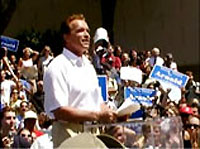 Next
look into The
First Step — declaring candidacy. What is the Federal
Election Commission? Why does a candidate have to submit tax returns
and register with his or her party?
Next
look into The
First Step — declaring candidacy. What is the Federal
Election Commission? Why does a candidate have to submit tax returns
and register with his or her party?
Discover why The Campaign Committee is important — for example, how do they comply with FEC rules? What exactly do the people on the committee, including the finance committee, do?
One of the most critical things to know about political campaigning is The Four "M"s — what are they and why do they matter so much? How might a campaign be disadvantaged if it was missing just one of those components? How do you think the Four "M"s influenced votes in the recent California race?
Also read about The Cost of the Campaign. In what ways is campaign money spent? What can candidates typically get for free? How do candidates get the money to run their campaigns?
On the Campaign Trail
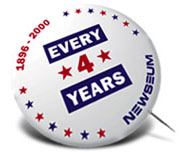 Successful campaigns are critical for a candidate to get noticed and
the media — one of the Four "M"s — plays a significant
role in reporting on these candidates and their campaigns.
Successful campaigns are critical for a candidate to get noticed and
the media — one of the Four "M"s — plays a significant
role in reporting on these candidates and their campaigns.
Discover more about the media's role Every 4 Years in the presidential campaigns. Choose either the Newseum's Shockwave Exhibit (includes audio clips) or the HTML Exhibit (text only) to browse through a century of political campaigning.
Open up the Doris Kearns Goodwin Essay in a second window, which you should read as a companion to the timeline as you move through the different eras.
Begin your journey On The Campaign Trail with reporters during The Rise of America's Newspapers, 1896-1924. Keep moving along the timeline, through the Network Radio Era, 1928-1948.
How did politicians' view of the media's role in campaigning change from the early years of newspapers to the popularity of radio broadcasts? In what ways may have polling public opinion and reporting on crowd numbers and activity influence campaign success?
Keep following the trail into the Network Television Era, 1952-1976, and the 24-hour News Era, 1980-2000.
How did television change the nature of political campaigns? How did the different types of media report the campaigns? How did reporting on candidates and their campaigns change over time? Do you think changes in the media, changes in society, or both influenced how candidates were covered by newspaper, radio, television, and online reporters?
Newspaper Activities
Using current issues of Targetnewspaper, follow the campaigns of local, regional, and national candidates that affect your area. Every day or week, count how many articles are devoted to political candidates or their campaigns. What details do the reporters include — for example, anything about the candidate's personality, history, or stance on an issue? Also, what kinds of and how many ads for each candidate do you notice in the newspaper, on TV, on the radio, or online? Can you identify each candidate's strengths and weaknesses? What is it about each candidate that matters most to the media or the general public? Do you think the media is fair in the way it covers each candidate's campaign? Does it seem to matter if he or she is a local or state candidate vs. a presidential candidate?
© Copyright 2003
Learners Online, Inc.
